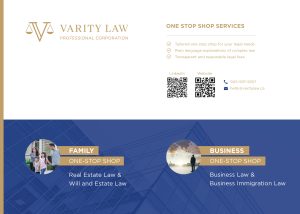With the ending of 2022 and the beginning of 2023, the legal team at Varity Law is giving our clients a gift: a set of simple solutions for your common legal problems. We invite you to continue reading and learn how even a few easy actions can make big differences to your family assets and to your business journey.

Real Estate
Homeowners and real estate investors should ensure:
- The deed ownership is correctly drafted. We’ll explain an example. If Sam and Rachel are listed as joint tenants on the deed, then there is right of survivorship. This means that when Rachel passes away, Sam will inherit 100% of the property. Rachel cannot leave any part of the property to her kids. However, if they held property as tenants in common – such as Sam held it as 50% TIA, and Rachel held as 50% TIA, then Rachel can pass down her 50% shares to her kids according to her Will.
- Houses that we live in have principal residence exemption – meaning that when we sell the property, it is tax-exempt. However, the same does not apply to investment properties that we rent out completely to tenants – we must pay capital gains when we sell those. Thus, a tax-efficient way for families to purchase multiple properties is to reduce the investment ownership. For instance, if John and Mary already have a principal residence, and they need to co-own another house with their son Dean to help with his mortgage application, then the parents should own 1% while Dean own 99%. That way, upon the sale, the parents only need to pay 1% of capital gain, while Dean’s 99% is tax-exempt since it’s his principal residence.
- Matrimonial home is always a common concern. This is the home that the married couple live in – and according to Family Law, they co-own it, even if only one spouse is on the deed. A simple way to set the records straight is to designate which property is the matrimonial home. For instance, Trey and Tina owns 3 properties – A and B are under Trey’s name, and C is under Tina’s name. They could live in A, and get Varity Law to register a designation of matrimonial home on A. That way, it would be very clear – A is the co-owned matrimonial home, B is the investment property belonging only to Trey, and C is the investment property belonging only to Tina.

Wills & Estate
- Many people understand that a Will is important, but unfortunately very few know what makes for a valid When signing the Will, the signature must be seen by 2 witnesses, who also need to sign – the witnesses cannot be the named beneficiaries in the Will nor their spouses. Then, one of the witnesses must swear an affidavit in front of a lawyer, who will sign and stamp the affidavit. When coming to our office to do Probate (the legal process for inheriting the estate), some people have a Will, but no affidavit, and they can no longer locate the original witness to do the affidavit. Then, unfortunately the Courts will likely find the Will to be invalid. Thus, it’s much better to come to Varity Law to get your Will done, as we will provide the 2 witnesses and the affidavit right there.
- At Varity Law, we always include a “bond exemption” clause on your Will. The Estate Court may require your executor to purchase a bond policy if they fear the estate would be wrongfully distributed. For instance, if your executor run away with the money without giving it to beneficiaries, or if your family and asset situation so complex that it’s difficult to tell who are the beneficiaries and what are your estate assets in the absence of a Will. But with a proper Will that lists everything clearly, such a risk should not exist. And with an explicit clause exempting bond policy, your executor should not need to buy bond. The policy is very expensive and can cost up to 5% of the entire estate, and it is not refundable.
- Varity Law will also add a “divorce clause”, which states that anything given to your beneficiaries are their personal assets and should not be split with their spouse upon a divorce, or in the unfortunate event that they die before the spouse. This would protect all inheritance except matrimonial home, as explained above. However, if your beneficiaries already have a house of their own, then that property would be their matrimonial home. The property you give to them under the Will should be treated as their investment property to avoid this problem.
Real Estate + Wills & Estates
All house-owners should have a Will. In the event that all property owners pass away, how your property should be distributed is much easier and cheaper when there is a Will, vs. no Will. With a Will and proper estate planning, you can significantly reduce the amount of estate taxes payable, decrease the legal and administration fees upon your passing, and reduce the time that Estate Courts need to examine your estate before allowing your beneficiaries to inherit it.
A point of caution is that most estate debts, including mortgages, cannot be inherited. So, if John and Mary leave their house to Dean, and there is a mortgage on it, Dean cannot inherit this mortgage. He must figure out a way to pay back the mortgage immediately upon his parents’ death, or sell the house, or he must apply for a new mortgage himself. He cannot just assume the mortgage and continue its monthly payments, because the original mortgage was assessed based on his parents’ income, not his.
What his parents could do is leave him some money in the form of life insurance, joint bank account, TFSA & RRSP with a designated beneficiary – he can get those money immediately after their passing without probate, he just needs to provide the death certificate. He can then use that money to pay out the mortgage first, and receive the debt-free house once probate is completed.

Businesses
- Mandatory corporate documents include registered documents, such as Articles of Incorporation, and unregistered documents, especially Corporate Minute Book. Articles record, among other things, who are the directors (people who operate the corporation), business name, registered address, share classes, etc. Minute book shows who are the shareholders (people who own the corporation), how many and which share class each shareholder owns, by-laws governing decision making process and liabilities, corporate resolutions showing whether corporate decisions are agreed to by all directors and/or shareholders, etc. Many people fail to get the minute book done because the government does not require it to be registered (in order to protect the shareholders’ privacy). However, this is an essential document proving corporate ownership and should be drafted by corporate law firms (like Varity Law). It is required whenever you need to transfer shares, buy/sell the corporation, close it down, or pass it to your beneficiaries.
- Many entrepreneurs have a mistaken belief about corporate law – that it is very restrictive and lists extensive rule governing corporate behaviour. In actuality, corporate law wants to give businesspeople as much freedom as possible – it’s best that they self-govern with the rules set in your contracts and agreements. Thus, it is essential to get those done with your corporate lawyer – the most common agreements include shareholder agreement, employee contracts, service agreements to clients, lease agreements, and supplier contracts. Setting clear rules up front can prevent years of expensive litigation down the line.
- Although many business owners are passionate about their companies, it is still good to set up an exit strategy up front. For instance, you should clearly list in your shareholder agreement what happens if a shareholder wants to leave – who is to buy their shares, and at what price? Would there be any non-compete or confidentiality requirements that would still apply to them, even though they are leaving?

Immigration
- Completing an immigration application requires much commitment. However, with the correct program and our clients’ willingness to follow through, we have gotten countless families and entrepreneurs their Canadian PR status in the past 5 years. Below are some suggestions:
- If you have a qualified Canadian employer, then you could consider OINP Foreign Worker, Federal EE + LMIA, Caregiver Program, etc.
- If you want to incorporate a new business, or buy an existing business, then you could consider OINP Entrepreneur, Intra-Company Transfer, Self-Employed program, etc.
- If you have a family member who is a Canadian permanent resident or citizen, then you could apply for family sponsorship. Within this category, spousal/ common-law/conjugal sponsorships have the lowest eligibility requirements (e.g. no strict income requirements), but do require much document preparation, attention to details, and immigration law experience – they are best handled by experienced immigration law firms like Varity Law
- If currently there’s no suitable immigration programs, you can still take the following actions, which is required under many programs:
- Increase your English or French scores with designated testing institutions;
- Increase your personal or corporate income;
- If you have post-secondary foreign education, do Education Credential Assessment for them, so they are recognized in Canada.
Business Law + Immigration Law
At Varity Law, we specialize in skilled, business, and family immigration. Our goal is to help you gain a stable livelihood while getting your entire family their Canadian PR status. We hope that from the moment you set foot on this foreign land, to your journey with your family & your career afterwards, we can help you every step of the way.

Varity Law wishes everyone a Merry Christmas and Happy 2023. We are deeply grateful that time and time again, our clients keep on coming back to us, as the ultimate validation of our expertise and care.
We look forward to continuing helping families and businesses in the coming years.
Please note that this articles provide general legal information, not specific legal advice that applies to your situation. For legal advice, please book a 1st free consultation with us here: https://calendly.com/sabrina-668/1stfreeconsult







